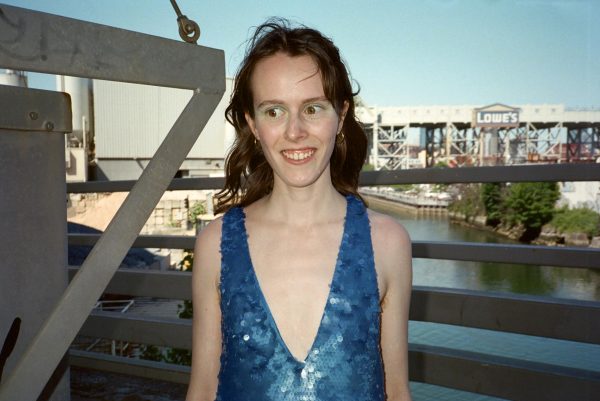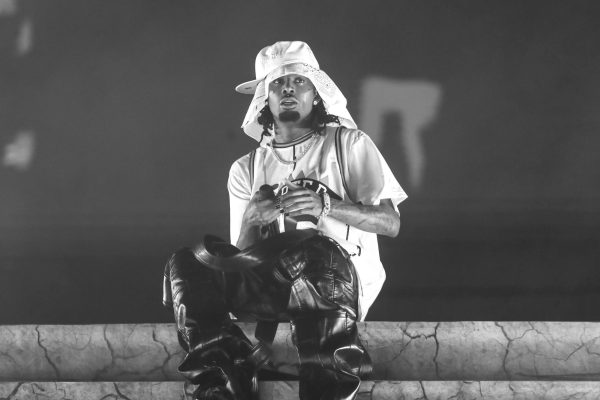Indie Group Preacher & Daisy Releases “Over Lake Erie”
Preacher & Daisy, an Oberlin student folk group, will be releasing its debut EP Over Lake Erie next week.
College senior Sam Bailey released his solo record Preacher & Daisy in the summer of 2017. Soon after, he began playing with College sophomore Eva Hilton to form an electric guitar and bass duo. Over time, Cody Edgerly, OC ’17, and Conservatory senior Maddy Baltor filled in on the drums and electric guitar, forming the indie-folk-rock group, Preacher & Daisy.
Bailey found the name for his fledgling group after reading a short story titled “The History of Rodney” by environmental writer Rick Bass.
“In the story, Daisy, is an old woman who has dedicated her life to waiting in the Mississippi ghost town of Rodney for her lover Preacher to come back,” Bailey said. “My freshman year, I wrote a song called ‘Preacher & Daisy’ inspired by the story and later decided to use the name for my musical project.”
After months of shows on and off campus, the group is releasing their first EP Dec. 7. After raising a few thousand dollars via GoFundMe, Preacher & Daisy made their way to Philadelphia to record the project at Miner Street Studios, where famous acts such as Sufjan Stevens, Modern Baseball, and Kurt Vile recorded their works. From the opening track, Over Lake Erie catches your ear with a vibrant and intimate sound.
The album was mixed by Matt Poirier and mastered by Xcoustic Sound. The final mixes create a wonderful balance among each instrument, and there are new intricacies to discover upon every listen. Even “Odyssey,” a song which did not have as effective a sound as the earlier tracks, had me admiring the quality of the mixes.
Each song is patiently paced — the titular track “Over Lake Erie” introduces the group’s emotionally-resonant style. The song’s arc, beginning with its patient build, is met with delicate vocal harmonies carried by its drifting instrumentation. Hilton’s harmonies and Bailey’s melody join together seamlessly to create a slow and somber dance, characterized by the intermingling of acoustic and electric guitar.
“Misty” shifts from catchy, word-heavy verses to its slow, ballad-like chorus. It’s similar to “Over Lake Erie,” but instead finds its heart in the chorus. Hilton’s intricate basslines fill the lower register over Bailey’s singing in the breakdown, and segue into a grand, yet solemn ending. This is another strength of Preacher & Daisy — every song closes with reflection, no matter its energy.
The fadeout of “Over Lake Erie” has Bailey lamenting: “I’m this world’s to waste / I’m this world’s to break.” This serves as a soft transition to the upbeat “Frequencies.” The juxtaposition between poetic lyrics and Edgerly’s upbeat drums captures a sense of urgency, as Bailey sings, “Sarah, I didn’t mean to disappear like that / Out in the Midwest chasing what I never had.”
Abstract imagery is grounded by these moments of intimacy and vulnerability. They are scattered throughout the recordings, and I pondered through my unanswered questions after every replay. Bailey’s doubled vocals in “Frequencies” are also a nice touch, and the powerful momentum puts Baltor’s guitar solos to overdrive, with a tone reminiscent of The Killers. This track is the highlight of the EP, sharing space for each band member’s contribution to be evenly admired.
“Odyssey” departs from emotional prayers and regrets, taking a turn into a blend closer to Americana and folk with a talk-sing hook. A song like this, about the beautiful lie of life, demonstrates the band’s ability to span multiple genres. Most impressive was the song’s dynamic rise and fall, filled with breakdowns and solos.
While “Odyssey” did not have the same punch as other tracks, its mellowness signaled a shift in tone to set the scene for “Clint Eastwood #2.” The stripped-down, acoustic track featured a solo performance by Bailey on guitar. Upon first listen, the bare instrumentation feels as though it does not do the rest of the EP justice, considering the complete sound of the band in the prior recordings. I found myself waiting for the full band to kick in, as it did in “Misty.” Yet his claims of self-loathing and hopelessness fit the acoustic, old-timey sound.
While this song did not fit in the context of the overall sound of Over Lake Erie, it stands on its own well. “Clint Eastwood #2” ends on a chord which sounds unresolved, beckoning the ear for that one final note to complete the song’s cycle. That resolution never comes — perhaps it will be found in Preacher & Daisy’s next record. For now, they know you’re listening. The emotional and mature lyricism, combined with the talent of Bailey, Hilton, Baltor, and Edgerly, create an emotional soundtrack of the hardships in the Midwest. Let us hope this is the first of many more records to come.









